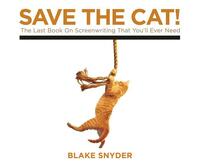You need to sign in or sign up before continuing.
Take a photo of a barcode or cover
informative
medium-paced
I bought the book beacuse I was having trouble getting the software to run (now solved!). When any book is so hyped as this one, especially in a field seemingly glutted with hyped books, I'm a bit skeptical. But I really did enjoy the quick-bite style, humor, and direct advice of this book.
Turns out, the BS2 (Blake Snyder's Beat Sheet) is acclaimed for good reason. I have already used it to outline a screenplay rewrite, to check the dynamic of a novella-in-progress, and to outline a new novel concept.
Turns out, the BS2 (Blake Snyder's Beat Sheet) is acclaimed for good reason. I have already used it to outline a screenplay rewrite, to check the dynamic of a novella-in-progress, and to outline a new novel concept.
Many nuggets of wisdom - and reminders that he's a successful screenwriter, so knows what he's talking about. His structure of 15 beats in a screenplay is interesting, and I suppose could fit a novel too. Might buy this for my writing shelf.
the guidelines this book set out have helped me to see the process of screenwriting a lot more clearly and have made my goals seem manageable
as a film student, i found it helped to solidify what i learnt in my lectures and to turn it into more applicable, real world advice
however, the author’s perspectives on the industry as a whole feels much more outdated than the timeless advice given (mostly because it was written before the rise of social media)
i also didn’t love the tone of some of the paragraphs addressing the readers, the author’s ‘humour’ was often just repeatedly convincing you to listen to him and trust the advice which i though was weird considering its a guidebook but maybe its just me
as a film student, i found it helped to solidify what i learnt in my lectures and to turn it into more applicable, real world advice
however, the author’s perspectives on the industry as a whole feels much more outdated than the timeless advice given (mostly because it was written before the rise of social media)
i also didn’t love the tone of some of the paragraphs addressing the readers, the author’s ‘humour’ was often just repeatedly convincing you to listen to him and trust the advice which i though was weird considering its a guidebook but maybe its just me
Ho sempre faticato a scrivere delle storie e non mi ero mai messo davvero a cercare come fare: le mappe mentali sono perfette per i discorsi in pubblico, il modello di Lucas Model è perfetto per i pitch in video. nel 2023 ho deciso di migliorare le mie abilità da Vlogger e tra i molti libri sull'argomento "sceneggiatura" questo veniva spesso fuori. La ragione è semplice: è fatto benissimo e ha tutto quello di cui un principiante ha bisogno: una struttura rigidissima, suggerimenti su come scrivere i testi e tantissimo altro . E' un libro perfetto per l'autore navigato? probabilmente no, ma chi di noi lo è veramente? Un'altra critica è quanto poco sia flessibile il modello di Blake Snyder. Consideriamole stampelle per iniziare. Stampelle d'oro in questo caso, ma stampelle. Il libro mi è piaciuto così tanto che gli ho dedicato uno spazio anche su ModelliMentali.com
guess i can still read something, huh?
shocking, i know.
this was nice! i started reading save the cat 'cause i was super excited to write again.
now i'm not as excited, but i had loads of nice insights.
shocking, i know.
this was nice! i started reading save the cat 'cause i was super excited to write again.
now i'm not as excited, but i had loads of nice insights.
Blake Snyder's approach feels too formulaic at times. However, the tips he presents in this book have proved vital; his comedic vein also make the reading a lot more pleasant than most technical books!
Muy chulo en cuanto a técnica de escritura. Sus propuestas de estructura y el tablero son muy claros y útiles.
This book was fascinating. I love discovering formulas, and this book lays out the formula used for the vast majority of Hollywood films. If you're interested in becoming a screenwriter you should read this, but the author's attitude is grating at times. Some of the shit that he writes makes it seem as though he's gotten into a ton of arguments with indie film writers, and in particular he has an ax to grind with the film Memento. That leads into the funniest part of the book, and why I think he's a bit clueless at times. To explain why Memento doesn't work, he goes into a fairly long analysis of...Miss Congeniality! Not another thriller or crime film, but a comedy. He also makes some seriously idiotic statements, like saying that the first Spider-Man film doesn't hold up to repeat viewing because it violates his "rule" called Double Mumbo Jumbo. For someone who treats box office receipts as the word of god (see his comments on Memento), he seems to ignore that a lot of Spider-Man's business had to come from repeat viewings. It wasn't a "moderate" hit...the movie was huge! Anyhow, aside from scattered idiocy, this book is great and required reading.
Save the Cat is a new take on genres and includes many streamlined approaches to focus on the most critical parts of story structure. I like including emotional charge for a scene (from McKee) and the conflicts. For quick prototyping, it's a great book. It's not the last writing book you'll need, however.







